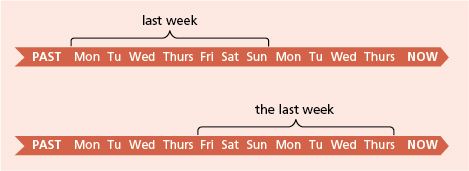last, the last, the latest
last week, month, etc; the last week, month, etc
Last week, month, etc (without the) is the week, month, etc just before this one. If I am speaking in July, last month was June; in 2016, last year was 2015.
The last week, month, etc is the period of seven/thirty, etc days up to the moment of speaking. On July 15th 2016, the last month is the period from June 16th to July 15th; the last year is the 12 months starting in July 2015.
Compare:
- I was ill last week, but I’m OK this week. (not
I was ill the last week …)
I’ve had a cold for the last week. I feel terrible. - We bought this house last year.
We’ve lived here for the last year, and we’re very happy with the place.
The difference between next and the next is similar. (see here)

the last three …, etc
Note the word order in expressions with numbers.
- I’ve been busy for the last three months. (not
… for the three last months.)
We generally say the last few days/weeks, etc, not the last days/weeks, etc.
- The last few days have been busy. (not
The last days …)
The last in a series
The last can also mean ‘the last in a series’.
- In the last week of the trip something funny happened.
- This is going to be the last Christmas I’ll spend at home.
latest and last
We can use latest to talk about something new, and last to mean ‘the one before’. Compare:
- Her latest book’s being published next week. (not
Her last book …)
She thinks it’s much better than her last one. - He’s enjoying his latest job. (not
He’s enjoying his last job.)
But it doesn’t pay as much as his last one.
For tenses with This is the last time …, etc, (see here).